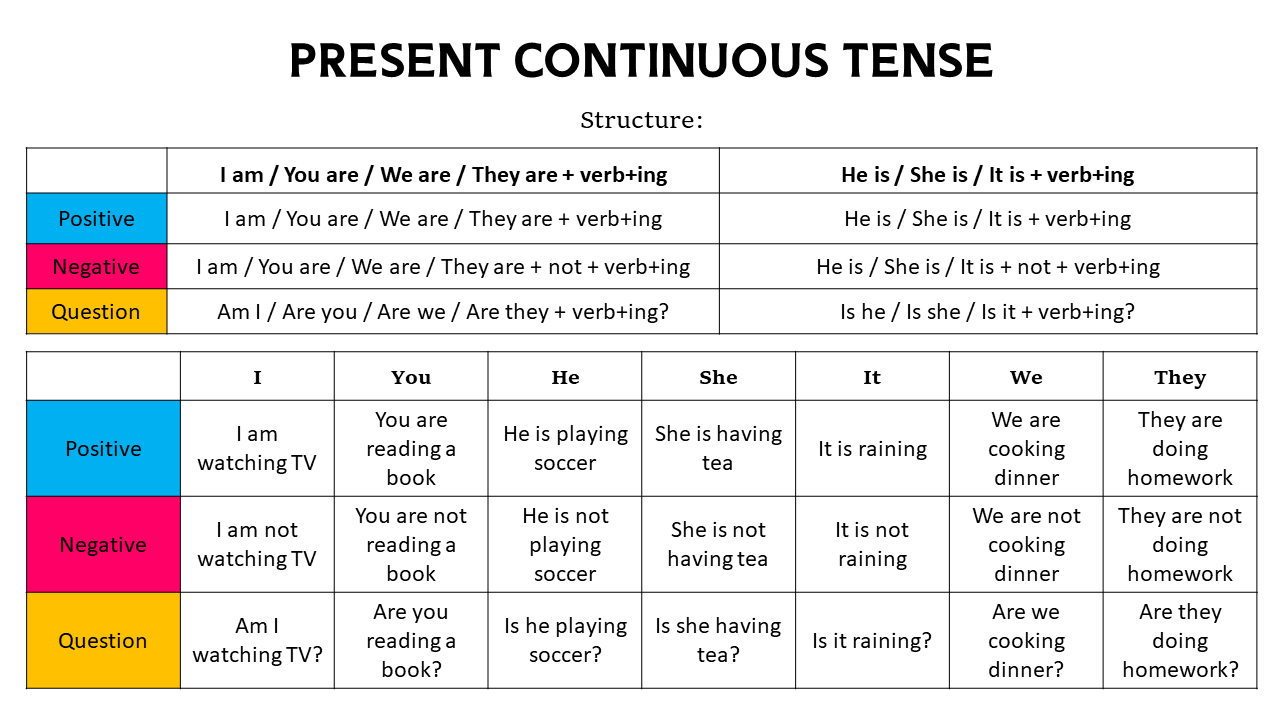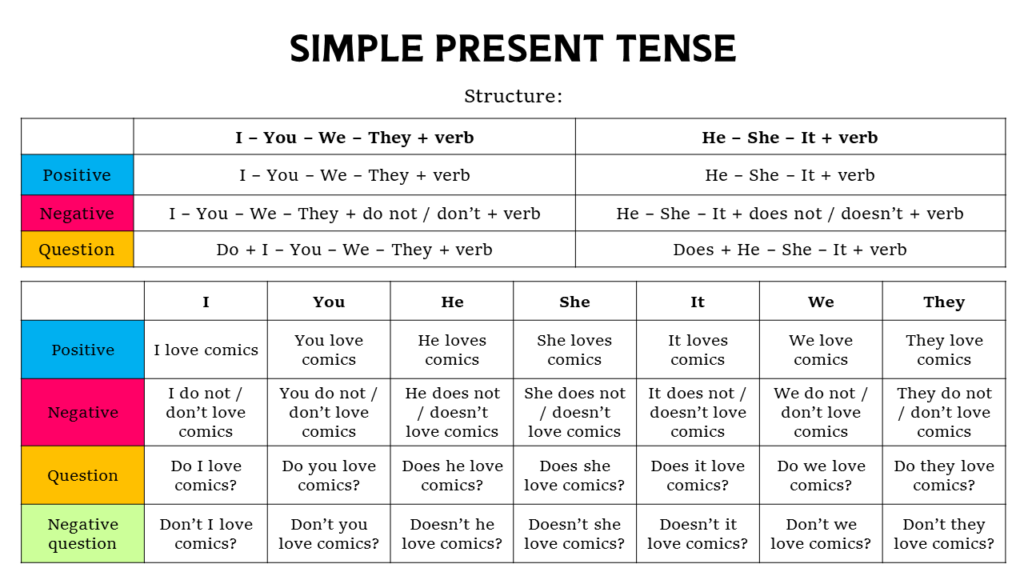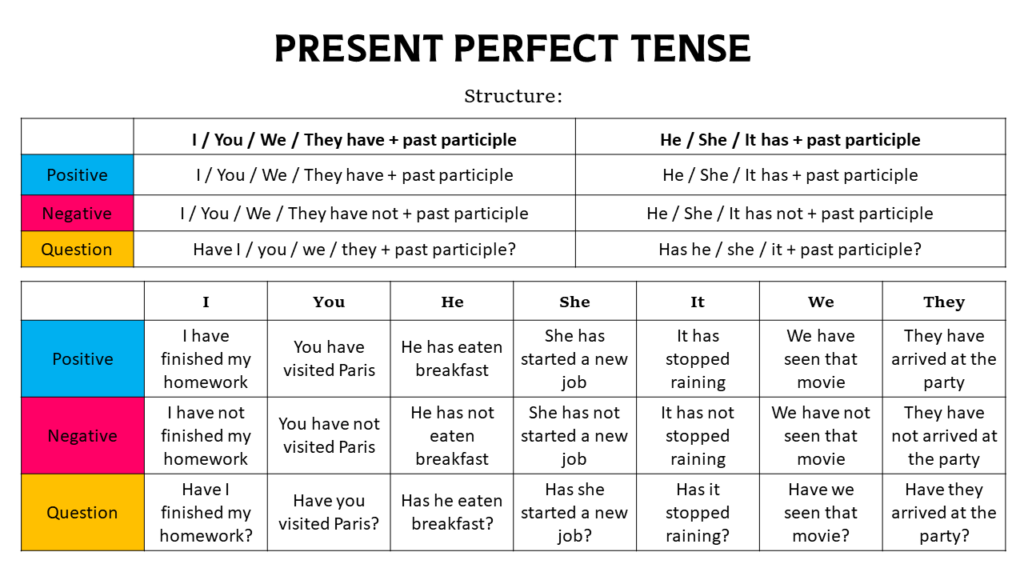The present continuous tense is an essential component of the English language, used to indicate actions currently in progress or future plans. It adds dynamism and specificity to our conversations and writings, allowing us to convey ongoing actions and temporary situations with clarity.
Definition
The present continuous tense, also known as the present progressive tense, describes actions that are happening at the moment of speaking or temporary actions that are ongoing. It can also refer to future arrangements.
Formula/Structure
The structure of the present continuous tense involves the subject, followed by the auxiliary verb “to be” (am/is/are), and the main verb in its -ing form. Here’s how it breaks down:
- Affirmative: Subject + am/is/are + verb(-ing)
- Example: “She is watching a movie.”
- Negative: Subject + am/is/are + not + verb(-ing)
- Example: “They are not playing football now.”
- Interrogative: Am/Is/Are + subject + verb(-ing)?
- Example: “Are you listening to me?”
Rules with Examples
- Add -ing to the base verb: “I am running.”
- For verbs ending in -e, drop the -e and add -ing: “She is dancing.”
- For one-syllable verbs with a single vowel followed by a consonant, double the consonant and add -ing: “He is swimming.”
How to Make Present Continuous Tense
1. Positive Present Continuous Tense
To form a positive sentence, use the subject plus “am,” “is,” or “are,” followed by the verb with an -ing ending.
2. Negative Present Continuous Tense
For a negative sentence, add “not” after “am,” “is,” or “are.”
3. Interrogative Present Continuous Tense
Start with “am,” “is,” or “are,” then the subject, and the verb in its -ing form.
Examples of Present Continuous Tense
Examples of Positive Present Continuous Tense
- “I am sitting at my desk.”
- “You are doing your homework.”
- “He is reading a book.”
- “She is cooking dinner.”
- “It is raining outside.”
- “We are planning a trip.”
- “They are watching a movie.”
- “The cat is sleeping on the sofa.”
- “The children are playing in the park.”
- “The teacher is explaining the lesson.”
Examples of Negative Present Continuous Tense
- “I am not waiting for anyone.”
- “You are not listening to me.”
- “He is not using the computer right now.”
- “She is not eating anything.”
- “It is not snowing today.”
- “We are not making any noise.”
- “They are not going to the party.”
- “The dog is not barking at the moment.”
- “The baby is not sleeping now.”
- “The students are not paying attention.”
Examples of Interrogative Present Continuous Tense
- “Am I disturbing you?”
- “Are you coming to the meeting?”
- “Is he working on the project?”
- “Is she watching her favorite show?”
- “Is it raining outside?”
- “Are we meeting them for lunch?”
- “Are they selling their house?”
- “Is the dog barking at strangers?”
- “Are the children doing their homework?”
- “Is the train arriving on time?”
The present continuous tense is versatile and frequently used in English. It allows speakers and writers to convey actions in progress, making communication more dynamic and specific. Understanding and mastering its form, rules, and usage can significantly enhance your English language skills.

Present Continuous Tense Exercise
Below is an exercise designed to test your knowledge and application of the present continuous tense. Fill in the blanks with the correct form of the verb in parentheses, then check your answers against the solutions provided.
Questions
- I (to read) a really interesting book right now.
- She (not to watch) TV at the moment.
- What (you to do) this weekend?
- The children (to play) in the garden now.
- He (not to use) his phone during meetings.
- Why (she to laugh)?
- We (to plan) our holiday for next summer.
- The cat (to sleep) on the sofa again.
- They (not to attend) the online seminar today.
- (it to rain) in your city?
Answers
- I am reading a really interesting book right now.
- She is not watching TV at the moment.
- What are you doing this weekend?
- The children are playing in the garden now.
- He is not using his phone during meetings.
- Why is she laughing?
- We are planning our holiday for next summer.
- The cat is sleeping on the sofa again.
- They are not attending the online seminar today.
- Is it raining in your city?
This exercise helps you practice forming sentences in the present continuous tense, focusing on positive, negative, and interrogative forms. Reviewing your answers with the solutions provided will help you assess your understanding and identify areas for improvement.


